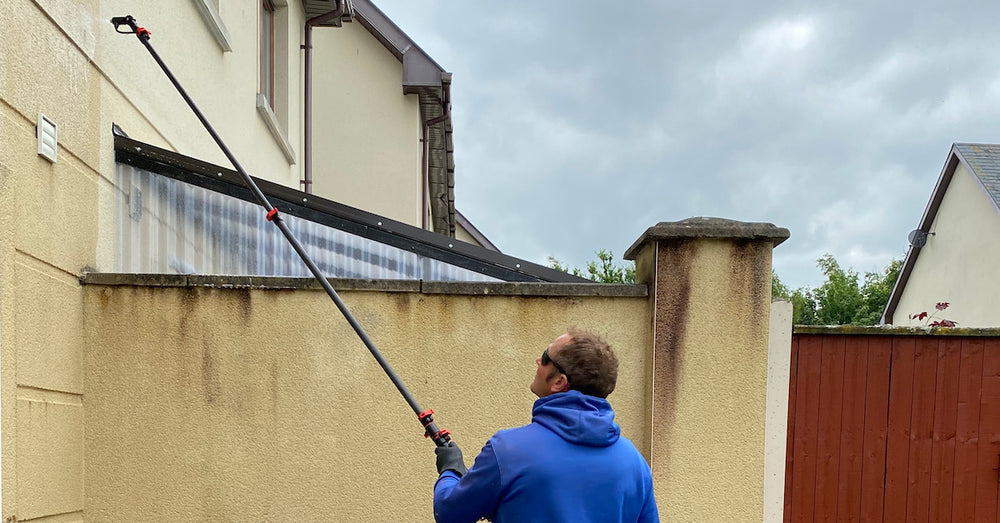
Why is coloured wall render presenting problems today?
In the past three decades or so self-finished renders have become popular. Architects liked the variety of finishes they offered – smooth, textured, mica sparkles, and colour pebbles to name a few – that were not so easy to obtain with paint.
Householders liked them because of their easy, low maintenance. They need no painting, just a light clean every now and again.
Builders liked them because there was no more hanging around waiting for paint to cure before completing the building.
But the introduction of modern wall insulation has reduced the amount of heat moving through the walls, reducing the ability of the external surfaces to dry out. This has led to a build up of biological growth on the walls, mainly red, black, and green algae.
Previously, the heat coming through the walls dried the render and so microbial growth, which likes damp conditions, was considerably less. And now rendered walls suffer from unsightly coloured staining from the algae, meaning that they need to be cleaned with high-quality biocide much more frequently – usually every three years or so.
Interestingly, the cleaner white patches on soiled render show areas where the insulation is not so effective, allowing heat to reach the external surface. This could be caused by patchy cavity wall filling or a radiator.
What are the best softwash products to treat pre-coloured wall render?
Benz Bio Cleanze is a non-aggressive, high purity biocide that is perfect for cleaning black, green, and red staining from wall render. It's particularly suitable for the prevailing weather of the UK and Ireland.
It's a Ph neutral quaternary ammonium with added IPA (isopropyl alcohol) that quickly cuts through the layer of biological growth (the “biofilm”), ensuring it’s completely killed.
It is used for ongoing maintenance programmes following initial cleaning by Benz Lightning Cleanze, or a combination of both products.
This biocide does not affect the colouring or chemical makeup of self-finished renders. On porous render, the biocide will soak deep to ensure the source of the staining is completely eliminated.
Lightning Cleanze offers a faster way to remove staining of all kinds from wall render and is particularly useful for removing stubborn black staining.
After cleaning with Bio Cleanze there sometimes may be black "ghosting" marks remaining. These will often disappear naturally through time, and the process can be speeded up by treating with Lightning Cleanze.
Rough cast and pebble dash
Textured surfaces often pick up grime as well as hosting algae. Brushing a solution of Bio Cleanze into the surface using a soft brush quickly deals with this. We recommend frequently rinsing the dirt from the brush in a solution of biocide.
What happens after a treatment of Benz Bio Cleanze?
Green and red algae die in a few minutes following treatment. If the biofilm is very thick, a milky sheen will show for a short while before being dispersed by the wind.
The orange pigment that comes from the red algae may stay for a bit but rain will soon wash it away, on average in about 10 days.
Bacteria and Cyanobacteria will also die within a few minutes with our recommended dilution of Benz Bio Cleanze. And the self-cleansing will continue for several days.
Moulds are a group of fungi, the most common of which cause the black staining that protects them from ultra-violet light. They dig their way into the surface of render and even rock. Because of their tenacious nature, moulds are not as easy to treat as is algae.
Although Bio Cleanze kills mould within a few minutes, the self-cleansing action will continue for several months. To speed this process up, rinse with plenty of fresh water a few days after treatment.
A 3-Step treatment of mould
1) Remove the worst of the mould with a scraper, or brush and water, until you can see the underlying surface.
2) Gently brush in a solution of Bio Cleanze. This will loosen the biofilm. Then spray with Bio Cleanze so any remaining mould is thoroughly soaked.
3) Around 6 weeks following treatment the black staining will be significantly less and whatever remains will usually soon wash away with the rain. Occasionally another rinse may be required to finish the job.
How long will treated render stay clean for?
The main factor that determines how long the render stays clean for is the cleanliness of the water that runs over it after treatment.
Bio Cleanze will have killed off the biological growth that was causing the staining the customer wanted removed. But if water (running off an untreated roof for example) dumps more of the same cocktail of algae and mould onto the walls, the problems will soon return.
So when treating it’s vitally important to carefully spray around parapets, overhangs, eves, door and window surrounds, and so on. Ideally, if the customer is willing to pay for it, treat the roof at the same time. We’ve found that when a customer understands the reasons why we suggest including the roof they often agree.
Quick tip: Our approach of choice is to soft wash render with Lightning Cleanze first, then follow up with Bio Cleanze to provide residual protection from re-colonisation and continue the process of deep cleansing of the surface through time.
We hope this information is helpful and sincerely wish you great success in your soft washing business,
Ben, Leo
, Fiona, Stevie & Anthony



Responses
Leo
Hi Jim. Hopefully you received our response to the same question you sent us via email earlier this week.
If you were to try yourself I would simply spray Perma Cleanze at 4:1. This will work on a light colonisation for sure and you would see some results in a few days and will continue for a couple of months. You would then need to decide if it needed a second treatment then or next year to promote further cleaning.
A contractor will be able to apply our professional strength products at higher concentrations, which may give faster and better results leading to the need for only one application. Many people have had great results with Perma Cleanze as long as the surfaces are well saturated.
October 16, 2020
Jim Williamson
I am looking to clean the Essno Dry Dash finish in the exterior of
October 16, 2020
Leave a comment